【最新】人教版九年级英语上册Unit1 How can we become good learners 单元练习题(附答案)
人教版(新目标)九年级全册Unit 1 How can we become good learner

Unit 1 How can we become good learners 3a【学习目标】1.熟练掌握Unit 1 Section A的重点词汇,短语和句型。
2.能够理解Unit 1 Section A 3a部分短文的大概意思。
3.独立完成书中的听力练习。
【学习过程】Step 1: 自主学习----明确目标自学文本任务一:请同学们课前上平台阅读思考本节预习案,明确本节课的学习任务和目标。
任务二:对照课本后面第一单元的单词表(156页)跟读单词录音。
要求:根据录音及单词音标,首先会读单词接着边读边写记单词,注意中英文的转换,最后默写单词。
任务三:自学教材①播放音频完成课本1-2页的听力练习②跟3页3a音频大声朗读课文,理解文章大意,划出不理解的地方。
阅读3a,判断句子正(T)误(F)。
()1. Wei Fen was afraid to ask questions because she was very shy.()2. Wei Fen didn't like the movie called Toy Story at all.()3. Wei Fen discovered that talking with foreigners is the secret to language learning.()4. Wei Fen looked up some sentences in a dictionary because she wanted to understand the story.()5. Now Wei Fen really enjoys her English class.Step 2: 自学检测----在线测学质疑思学在线测学:请你在平台完成以下自学检测(Unit 1-Section A自学检测),提交后自己看错题及解析。
自学检测一、单词冲关1. 大声地;出声地adv. ________2. 发音;读音n. _____________→(同根词)发音v. __________3. 有耐心的adj.________→(派生词)耐心;耐性n. ________→(反义词)没有耐心的adj. __________4. 表情;表示;表达方式n. __________→(同根词) 表示;表达v. ________5. 发现;发觉v. __________→(易混词)发明v. ________6. 秘密;秘诀n. 秘密的;保密的adj. ________二、短语冲关1. 向某人求助________________2. 尽力做某事______________3. 害怕做某事__________________4. 爱上……______________5. 查阅;抬头看____________6. 练习做某事__________________7. 记笔记____________8. finish doing sth. ____________9. give a report _________10. at first ______________11. word by word __________12. make word cards ____________三、句型冲关1. “你怎样备考?”“我通过参加学习小组来备考。
人教版九年级全 Unit 1 How can we become good learners
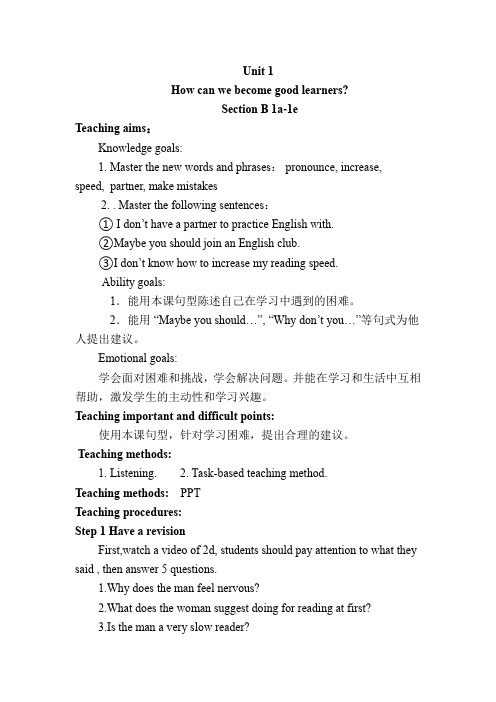
Unit1How can we become good learners?Section B 1a-1eTeaching aims:Knowledge goals:1. Master the new words and phrases:pronounce, increase, speed,partner,make mistakes2. . Master the following sentences:① I don’t have a partner to practice English with.②Maybe you should join an English club.③I don’t know how to increase my reading speed.Ability goals:1.能用本课句型陈述自己在学习中遇到的困难。
2.能用“Maybe you should…”,“Why don’t you…”等句式为他人提出建议。
Emotional goals:学会面对困难和挑战,学会解决问题。
并能在学习和生活中互相帮助,激发学生的主动性和学习兴趣。
Teaching important and difficult points:使用本课句型,针对学习困难,提出合理的建议。
Teaching methods:1. Listening.2. Task-based teaching method.Teaching methods: PPTTeaching procedures:Step1Have a revisionFirst,watch a video of2d,students should pay attention to what they said,then answer5questions.1.Why does the man feel nervous?2.What does the woman suggest doing for reading at first?3.Is the man a very slow reader?4.How to guess a word’s meaning according to the woman?5.How can the man be a fast reader?Second,a student gives a speech about how do you learn English?教学设计说明:利用真人真事的学习经验,激发起学生的探究欲望。
人教版九年级英语1-14单元课文翻译
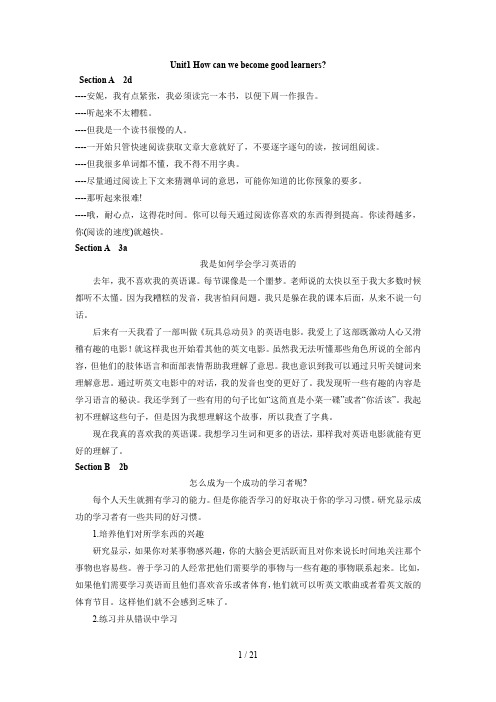
Unit1 How can we become good learners?Section A 2d----安妮,我有点紧张,我必须读完一本书,以便下周一作报告。
----听起来不太糟糕。
----但我是一个读书很慢的人。
----一开始只管快速阅读获取文章大意就好了,不要逐字逐句的读,按词组阅读。
----但我很多单词都不懂,我不得不用字典。
----尽量通过阅读上下文来猜测单词的意思,可能你知道的比你预象的要多。
----那听起来很难!----哦,耐心点,这得花时间。
你可以每天通过阅读你喜欢的东西得到提高。
你读得越多,你(阅读的速度)就越快。
Section A 3a我是如何学会学习英语的去年,我不喜欢我的英语课。
每节课像是一个噩梦。
老师说的太快以至于我大多数时候都听不太懂。
因为我糟糕的发音,我害怕问问题。
我只是躲在我的课本后面,从来不说一句话。
后来有一天我看了一部叫做《玩具总动员》的英语电影。
我爱上了这部既激动人心又滑稽有趣的电影!就这样我也开始看其他的英文电影。
虽然我无法听懂那些角色所说的全部内容,但他们的肢体语言和面部表情帮助我理解了意思。
我也意识到我可以通过只听关键词来理解意思。
通过听英文电影中的对话,我的发音也变的更好了。
我发现听一些有趣的内容是学习语言的秘诀。
我还学到了一些有用的句子比如“这简直是小菜一碟”或者“你活该”。
我起初不理解这些句子,但是因为我想理解这个故事,所以我查了字典。
现在我真的喜欢我的英语课。
我想学习生词和更多的语法,那样我对英语电影就能有更好的理解了。
Section B 2b怎么成为一个成功的学习者呢?每个人天生就拥有学习的能力。
但是你能否学习的好取决于你的学习习惯。
研究显示成功的学习者有一些共同的好习惯。
1.培养他们对所学东西的兴趣研究显示,如果你对某事物感兴趣,你的大脑会更活跃而且对你来说长时间地关注那个事物也容易些。
善于学习的人经常把他们需要学的事物与一些有趣的事物联系起来。
(完整版)人教版九年级英语课文原文unit1Howcanwebecomegoodlearners

Unit 1 How can we become good learners?Last year, I didn’t like my English class. Every class was like a bad dream. The teacher spoke so quickly that I didn’t understand her most of the time. I was afraid to ask questions because of my poor pronunciation. I just hid behind my textbook and never said anything.Then one day I watched an English movie called toy story. I fell in love with this exciting and funny movie! So I began to watch other English movies, too. Although I could not understand everything the characters said, their body language and the expressions on their faces helped me to get the meaning. I also realized I could get the meaning by listening for just the key words. My pronunciation improved as well by listening to the conversations in English movies. I discovered that listening something interesting is the secret to language learning. I also learned useful sentences like “It’s a piece cake”or “It serves you right”. I did not understand these sentences at first. But because I wanted to understand the story, I looked them up in the dictionary.Now I really enjoy my English class. I want to learn new words and more grammar so that I can have a better understanding of English movies.How Can You Become a Successful L earner?Everyone is born with the ability to learn. But weather or not you can do this well depends on your learning habits. Research shows that successful learners have some good habits in common.Creating an interest in what they learnStudies show that if you are interested in something, your brain is more active and it is also easier for you to pay attention to it for a long time. Good learners often connect what they need to learn with something interesting. For example,if they need to learn English and they like music or sports, they can listen to English songs or watch sports programs in English. This way they will not get bored.Practising and learning from mistakesGood learners think about what they are goog at and what they need to practise more. Remember, “Use it or loser it.”Even if you learn something well,you will forget it unless you use it. “Practice makes perfect.”Good learners will keep practising what they have learned, they are not afraid of making mistakes. Alexander Graham Bell did not invent the telephone overnight. He succeeded by trying many times and learning from his mistakes.Developing their studying skillsIt is not enough to just study hard. Good learners know the best way they can study. For example, they may take notes by writing down key words or by drawing mind maps. They also look for ways to review what they have learned. They may do this by reading their notes every day or by explaining the information to another student. Asking questionsGood learners often ask questions during or after class, They even ask each other and try to find out the answers. Knowledge comes from questioning.Learning is a lifelong journey because every brings something new. Everything they you learn becomes a part of you and changes you, so learn wisely and learn well.。
人教版九年级英语Unit1How can we become good learners
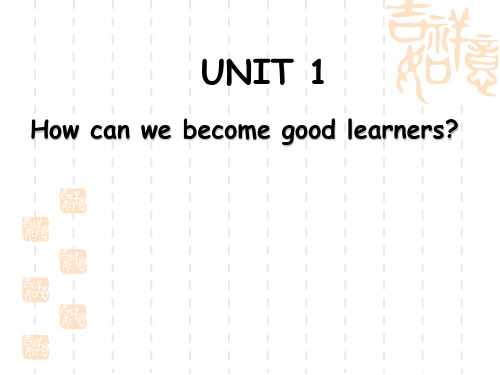
(5) 组成其它短语: 1) by the way : 意为“顺便说”、“顺便问 一 下”,常做插入语。如: 顺便问一下,李丽在哪儿? By the way, where’s Lily? 2) by oneself : 意为“单独”、“自己”。 如: 我不能把她单独留下。 I can’t leave her by herself.
阅读3a短文,回答下列问题
1.Why did Wei Fen find it difficult to learn English? Because the teacher spoke so quickly that she didn’t understand her. 2. What did she do in English class? She just hid behind her textbook and never said anything. 3. What is the secret to language learning? Listening to something interesting is the secret to language learning.
Listen and check the 2a questions you hear. 1 ____ Does anyone learn English by watching videos? 2 ____ Do you have conversations with friends in English? n. 交谈; 谈话 3 ____ What about listening to tapes? 4 ____ What about reading aloud to adv. 大声地 ; practice pronunciation? 出声地 5 ____ Have you ever studied with a group?
人教版九年级英语Unit-1How-can-we-become-good-learners重点解析.

注意:该句式中的have或has是助动
词,has用于第三人称单数,其它人称
一律用have。
2. 否定句:现在完成时的否定句式是 “haven’t(hasn’t)+过去分词”。 3. 疑问句:现在完成时的一般疑问句式 是把助动词have或has提到主语之前。 回答用Yes, …have (has). /No, …haven’t (hasn’t). 连用时间状语:already, yet, ever, never, just, before, several times 等。
2) by+ 交通工具、交通方式名词 travel by air /land/sea. go by train /boat/ bus 3) by+ 地点名词。表方位,“在……旁边” by the lake/river/window/door
4) by+时间名词。“到……时(已发生某事); 最晚、不迟于……;在……之前”,此时谓语多 用完成时。 By now/ then/ this time/ next Friday/ the end of last year/ three o’clock
3)(指方式、方法)怎样,怎么 How did you solve this question? 你是如何解决这个问题的? How do you get to school? 你是如何去学校的? 4) 用于惊叹句中,表示多么、何等。 How well you look! 你看起来多么健康啊! How I wish to have a long vacation these days! 这些天我多么希望去度一次长假啊!
3、另外, by作为介词的意义有很多, 例如: 1)逐批 one by one 一个接一个 2)沿着,经由 come by the highway 由公路来 3)由于 by mistake 由于差错 4)被,由 some articles written by Lu Xun 一些由鲁迅写的文章 5)表示面积 a room 5m by 4m 一间长五米宽四米的房间 4、固定短语
人教版英语九年级全册Unit1Howcanwebecomegoodlearners教学设计
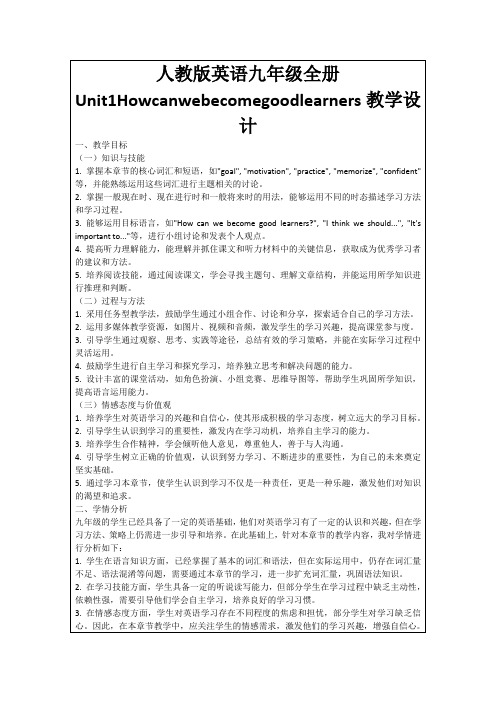
(3)开展学习策略分享活动,引导学生总结、分享自ቤተ መጻሕፍቲ ባይዱ的学习方法,相互借鉴,共同提高。
2.教学过程设想:
(1)导入:通过展示一组关于学习的图片,引导学生讨论学习的重要性,激发学生学习兴趣。
(2)新课内容呈现:呈现本节课的核心词汇和短语,结合课文,讲解三种时态的用法,让学生在语境中感知、理解。
(3)自我评价:鼓励学生进行自我反思,评价自己在学习过程中的优点和不足,制定改进措施。
四、教学内容与过程
(一)导入新课,500字
1.教学活动设计:教师展示一组关于学习的图片,如学生在图书馆阅读、认真听课、做实验等,引导学生观察并思考这些图片的共同点。
2.提问:教师提问学生:“What do you think is the key to success in study?”(你认为学习成功的关键是什么?)
(2)通过小组合作、分享等活动,培养学生的合作意识,提高沟通与协作能力。
(3)结合课文内容,引导学生认识到学习的重要性,树立正确的价值观。
4.教学评价设想:
(1)形成性评价:关注学生在课堂活动中的表现,及时给予鼓励和指导,提高学生的积极性。
(2)终结性评价:通过课后作业、测试等形式,全面评价学生的学习成果。
(3)课堂活动:设计小组合作、讨论、分享等活动,让学生运用所学知识,提高听说读写能力。
(4)巩固练习:设计形式多样的练习题,巩固所学知识,如填空、选择、翻译等。
(5)总结与反馈:引导学生总结本节课所学内容,教师给予及时反馈,强化重点,解决难点。
3.针对情感态度和价值观的培养,采用以下教学策略:
初三英语上册(人教新目标)Unit1Howcanwebecomegoodlearners-知识点总结
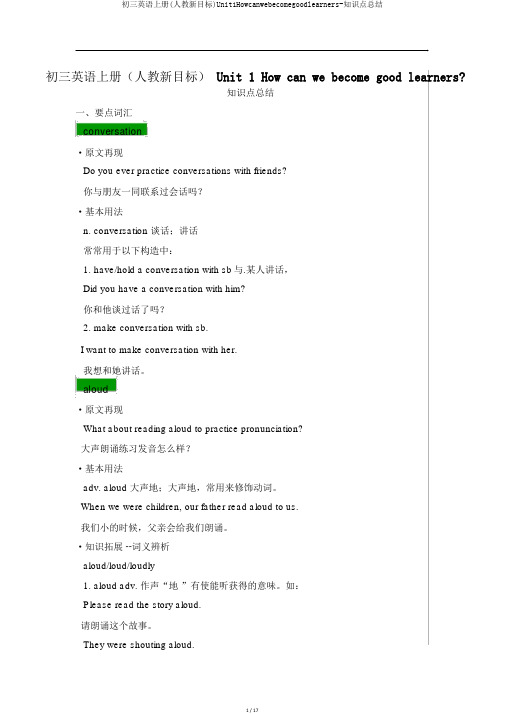
初三英语上册(人教新目标)Unit 1 How can we become good learners?知识点总结一、要点词汇conversation·原文再现Do you ever practice conversations with friends?你与朋友一同联系过会话吗?·基本用法n. conversation 谈话;讲话常常用于以下构造中:1. have/hold a conversation with sb与.某人讲话,Did you have a conversation with him?你和他谈过话了吗?2. make conversation with sb.I want to make conversation with her.我想和她讲话。
aloud·原文再现What about reading aloud to practice pronunciation?大声朗诵练习发音怎么样?·基本用法adv. aloud 大声地;大声地,常用来修饰动词。
When we were children, our father read aloud to us.我们小的时候,父亲会给我们朗诵。
·知识拓展 --词义辨析aloud/loud/loudly1.aloud adv. 作声“地”有使能听获得的意味。
如:Please read the story aloud.请朗诵这个故事。
They were shouting aloud.他们在大声地呼叫。
2.loud. adv. 大声“地,大声地,响亮地”,常指在谈笑等方面。
如:Don't talk so loud.不要这样大声地讲话。
Speak louder.说得大声点儿。
3.loudly adv. 大声“地”有时与 loud 通用,但含有喧杂的意味。
如:Someone knocked loudly at the door.有人大声叩门。
【人教新目标版】九年级英语全册必考话题作文Unit1Howcanwebecomegoodlearners

Unit 1 How can we become good learners?本单元话题为“学会学习”,与之相关的话题作文主要为谈论英语学习方法,这是各地中考英语真题中最常考的话题作文之一。
写作时可根据具体要求或提示,对相关的学习方法提出建议。
写作此类话题作文的常用表达有:(1)What about listening to…?(2)Try to guess …by…(3)The more…,the more…(4)…is the secret to language learning.(5)I think…should…(6)It’s a good idea to…【典型例题】为了交流学习经验,提高学习效率,某初中英语学习报正在举办以“how to be a good learner”为题的征文比赛,请踊跃投稿。
【优秀范文】How to be a good learnerTo be a good learner, we should have good habits and ways of learning.We need to get ready for our lessons before class and always listen carefully in class. After class, we must go over the lessons and finish our homework on time. It’s good to study in groups and help each other. We should do more reading in our free time. If we have any problem s, we’d better ask others for help.As a student, working hard is important, but don’t forget to do sports and keep healthy.I think all above is helpful to us to be a good learner.。
人教版九年级英语《Unit 1How can we become good learners?》说课
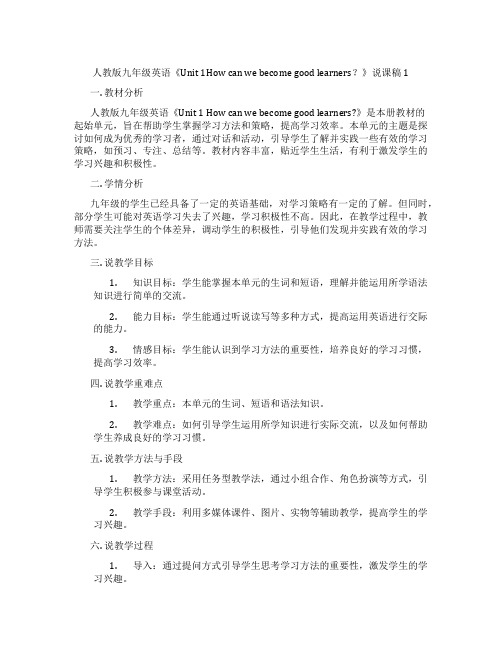
人教版九年级英语《Unit 1How can we become good learners?》说课稿1一. 教材分析人教版九年级英语《Unit 1 How can we become good learners?》是本册教材的起始单元,旨在帮助学生掌握学习方法和策略,提高学习效率。
本单元的主题是探讨如何成为优秀的学习者,通过对话和活动,引导学生了解并实践一些有效的学习策略,如预习、专注、总结等。
教材内容丰富,贴近学生生活,有利于激发学生的学习兴趣和积极性。
二. 学情分析九年级的学生已经具备了一定的英语基础,对学习策略有一定的了解。
但同时,部分学生可能对英语学习失去了兴趣,学习积极性不高。
因此,在教学过程中,教师需要关注学生的个体差异,调动学生的积极性,引导他们发现并实践有效的学习方法。
三. 说教学目标1.知识目标:学生能掌握本单元的生词和短语,理解并能运用所学语法知识进行简单的交流。
2.能力目标:学生能通过听说读写等多种方式,提高运用英语进行交际的能力。
3.情感目标:学生能认识到学习方法的重要性,培养良好的学习习惯,提高学习效率。
四. 说教学重难点1.教学重点:本单元的生词、短语和语法知识。
2.教学难点:如何引导学生运用所学知识进行实际交流,以及如何帮助学生养成良好的学习习惯。
五. 说教学方法与手段1.教学方法:采用任务型教学法,通过小组合作、角色扮演等方式,引导学生积极参与课堂活动。
2.教学手段:利用多媒体课件、图片、实物等辅助教学,提高学生的学习兴趣。
六. 说教学过程1.导入:通过提问方式引导学生思考学习方法的重要性,激发学生的学习兴趣。
2.呈现:展示与本单元主题相关的图片、实物等,引出本节课的学习内容。
3.操练:分组进行角色扮演,让学生在实际语境中运用所学知识。
4.巩固:通过完成任务、小组讨论等方式,巩固所学知识。
5.拓展:引导学生总结有效的学习方法,分享自己的学习经验。
6.总结:对本节课的主要内容进行总结,布置课后作业。
九年级英语上Unit1_How_can_we_become_good_learners 知识点归纳

Unit 1 How can we become good learners?课文知识点解析“by+doing形式”表示方式、方法语法结构by+doing形式,“通过做...的方式”I learn Chinese by listening to tapes。
提问方式by+doing结构常用来回答How do you...?或How can I...?这类句型-How can I turn on the light? -By turning this button.拓展:介词by的其他用法:1)by+交通工具,“乘/坐...”by bus2)by+地点,“在...的旁边;靠近...”by the lake3)by+时间,“截止到...;不迟于...”by ten4)辨析by、with、in,“用”by 侧重“用”某种手段、交通工具、传递方式或媒介等with 侧重“用”有形工具、材料、内容等in 侧重“用”语言、语调、笔墨、颜色等Eg. We’ll be traveling by car.He broke the window with a stone.Please answer the question in English.即学即练:1.-How do you learn English words? -_____making word cards.A. ToB. ByC. ForD. With2.-How do you get to school every day. Lucy? -I go to school _____.A.ride my bikeB.by my bikeC.by busD.by a bus3.Mr.Scott made a living by____(sell) old things.4.She learns English by listening to tapes.(对划线部分提问)_____ ______ she learn English?5.Most of them take the train to work.(改为同义句)Most of them go to work ______ ______.要点详解:Section A1.by asking the teacher for help通过向老师求助。
人教版九年级英语Unit1Howcanwebecomegoodlearners解答
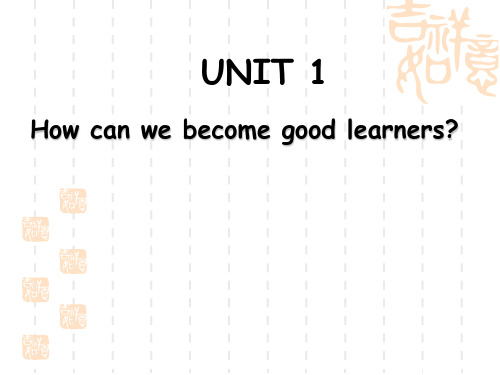
(3) 意为“依靠”、“用” 、“凭借”、“通 过”、“乘坐” 等。表示方法、手段。如: 我乘公交车去上学。
I go to school by bus. (4) 意为“被”、“由”等。用于被动句中, 表示行为主体。如: 许多人讲英语。
English is spoken by many people.
(5) 组成其它短语: 1) by the way : 意为“顺便说”、“顺便问 一
下”,常做插入语。如: 顺便问一下,李丽在哪儿?
By the way, where’s Lily? 2) by oneself : 意为“单独”、“自己”。 如:
UNIT 1
How can we become good learners?
1.Do you have good ways to learn English? 2.How do you study your English?
Language points
by在初中英语中的用法有以下几种: (1) 意为靠“在……旁”、“近”。 如:们在湖边画画。 They are drawing by the lake.
She learns English by working with friends.
She learns English by making word cards.
He learns English by reading the textbook.
He learns English by watching TV.
The _m__o__re____, the___b__e_tt_e_r____.
九年级英语全册Unit1Howcanwebecomegoodlearners基础知识梳理(新版)人教新目标版

九年级英语全册:Unit 1 How can we become good learners?第1课时Section A(1a2d)aloud adv.大声地;出声地pronunciation n.发音;读音。
其动词形式为pronouncepatient adj. 有耐心的。
n. 病人。
其反义词为impatient 【拓展】(1)aloud, loud和loudly都意为“大声地”,但用法有区别。
①aloud 强调能让人听得见。
常与动词read, call等连用。
如:Read aloud so that we can all hear you. 大点声读,以便我们大家都能听见你。
②loud 强调声音响亮。
常与动词speak, talk, say, laugh等连用。
常用比较级形式。
如:Facts speak louder than words. 事实胜于雄辩。
③loudly 有时可与loud通用,但含有“喧闹”或者“嘈杂”的意味。
如:Don't talk so loudly. 别这么高声说话。
(2)patient的常用短语: be patient with sb. 对某人有耐心; be patient to do sth. 有耐心做某事; be patient of…能忍受/容忍……have conversations with 和……交谈finish doing sth. 完成做某事give a report 做报告word by word 逐字/词地☆It's too hard to understand spoken English.理解英语口语太难了。
“It is+adj.+to do sth.”结构,it在句中作形式主语,真正的主语是动词不定式的内容。
如:He speaks in a low voice. It's too hard to hear him clearly. 他说话声音很低,太难听清楚他说什么了。
九年级Unit 1 How can we become good learners重点解析

人教版英语九年级单元重点知识Unit 1 How can we become good learners?.基础夯实【重点单词短语过关】读一读背一背note n.笔记;记录 v.注意;指出pal n.朋友;伙伴pattern n.模式;方式physics n.物理;物理学chemistry n.化学partner n.搭档;同伴pronounce v.发音increase v.增加;增长speed n.速度 v.加速ability n.能力;才能textbook n.教科书;课本conversation n.交谈;谈话aloud adv.大声地;出声地pronunciation n. 发音;读音sentence n.句子patient adj.有耐心的 n.病人expression n.表达方式;表示discover v.发现;发觉secret n.秘密;adj. 秘密的fall in love with 爱上;与...相爱基础夯实【重点单词短语过关】读一读背一背attention n.注意;关注pay attention to 注意;关注connect v.(使)连接;与...有联系connect…with... 把...和...连接或联系起来overnight adv.一夜之间;在夜间review v.& n.回顾;复习knowledge n.知识;学问wisely adv.明智地;聪明地grammar n.语法repeat v.重复;重做study for a test 备考have conversations wit与…交谈speaking skills 口语技巧a little 有点儿at first 起初起先because of 因为as well 也brain n.大脑active adj.活跃的;积极的look up 查阅;抬头看基础夯实【重点单词短语过关】读一读背一背make mistakes 犯错误talk to 交谈depend on 依靠依赖in common 共有的for example 例如think about 考虑even if 即使尽管纵容look for 寻找worry about 担心担忧learning habits 学习习惯make word cards 制作单词卡片ask the teacher for help 向老师求助spoken English 英语口语word by word 一字一字地take notes 记笔记how often 多久一次a lot of 许多the ability to do sth. 做某事的能力be interested in 对……感兴趣get bored 感到无聊基础夯实【单元目标语句回顾】读一读练一练--How do you study for a test?--I study by working with a group.--What about reading aloud to practice pronunciation? --It's too hard to understand spoken English.--Have you ever studied with a group?--Yes,I have.I've learned a lot that way-- How can I read faster?--You can read faster by reading word groups.--One way is by listening to tapes.单词和短语精讲1. little用法little用作形容词时有两种用法:①修饰人、事或物,表示“小的,幼小的,矮小的”,②表示数量“很少,几乎没有”,本身就含有否定意思。
人教版英语九年级Unit 1《How can we become good learners》全单元

人教版英语九年级Unit 1《How can we become good learners》全单元教学设计一. 教材分析人教版英语九年级Unit 1《How can we become good learners》主要讨论如何成为一名优秀的学习者。
本单元的主题贴近学生的生活,激发学生对学习的思考。
通过本单元的学习,学生可以了解和掌握一些学习方法和技巧,提高自己的学习效率。
二. 学情分析九年级的学生已经具备一定的学习经验和学习方法,但仍有部分学生在学习中存在一定的问题,如学习方法不当、学习效率低下等。
因此,本单元的教学设计需要针对学生的实际情况,引导学生反思自己的学习方法,帮助他们找到更有效的学习策略。
三. 教学目标1.知识目标:学生能够掌握本单元的重点词汇和句型,能够运用所学知识进行日常交流。
2.能力目标:学生能够通过pr work、group work等形式提高口语交际能力。
3.情感目标:学生能够认识到学习方法的重要性,树立正确的学习观念。
四. 教学重难点1.重点:本单元的重点词汇和句型。
2.难点:如何引导学生反思自己的学习方法,帮助他们找到更有效的学习策略。
五. 教学方法1.任务型教学法:通过完成各种任务,激发学生的学习兴趣,提高学生的参与度。
2.合作学习:通过pr work、group work等形式,培养学生的团队协作能力。
3.启发式教学:引导学生思考,激发学生的学习兴趣和动力。
六. 教学准备1.教师准备:对本单元的教学内容进行深入学习,了解学生的学习情况。
2.学生准备:预习本单元内容,完成相关的预习任务。
七. 教学过程1.导入(5分钟)通过提问的方式引导学生思考学习方法的重要性,激发学生的学习兴趣。
2.呈现(10分钟)呈现本课的主题,介绍本课的学习目标,让学生明确本课的学习内容。
3.操练(15分钟)通过pr work、group work等形式,让学生进行口语交际,巩固所学知识。
4.巩固(10分钟)通过完成各种任务,让学生运用所学知识,提高学生的实际运用能力。
新人教版初三英语Unit1Howcanwebecomegoodlearners?知识点

新人教版初三英语Unit1Howcanwebecomegoodlearners?知识点我们学语言的目的就是为了应用,要学会在用中学习,这样才能提高兴趣,达到好的学习效果。
下面是小偏整理的新人教版初三英语Unit1Howcanwebecomegoodlearners?知识点,感谢您的每一次阅读。
新人教版初三英语Unit1Howcanwebecomegoodlearners?知识点【重点短语】1.haveconversationwithsb.同某人谈话2.too…to…太……而不能3.thesecretto………的秘诀4.beafraidofdoingsth./beafraidtodosth.害怕做某事5.lookup查阅6.repeatoutloud大声跟读7.makemistakesin在……方面犯错误8.connect……with…把……和……连接/联系起来9.getbored感到厌烦10.bestressedout焦虑不安的11.payattentionto注意;关注12.dependon取决于;依靠13.theabilitytodosth..做某事的能力【考点详解】1.by+doing通过……方式(by是介词,后面要跟动名词,也就是动词的ing形式)2.talkabout谈论,议论,讨论Thestudentsoftentalkaboutmovieafterclass.学生们常常在课后讨论电影。
talktosb=talkwithsb与某人说话3.提建议的句子:①What/howabout+doingsth.?做…怎么样?(about后面要用动词的ing形式,这一点考试考的比较多)如:What/Howaboutgoingshopping?②Whydon'tyou+dosth.?你为什么不做…?如:Whydon'tyougoshopping?③Whynot+dosth.?为什么不做…?如:Whynotgoshopping?④Let's+dosth.让我们做…...吧。
新人教版九年级上册英语Unit1 How can we become good learners?
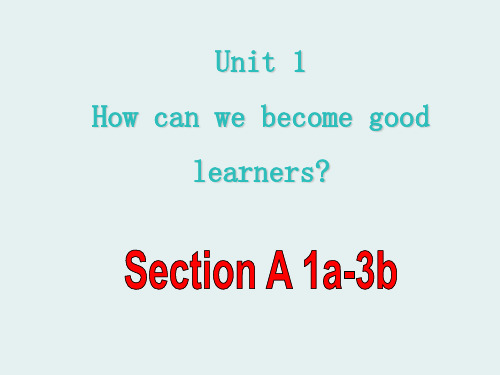
reading English texts
Language points
1. How do you… for…? by +doing
---How do you study for a test? ---I study by making word cards.
√ _____ 4. What about reading aloud to
practice pronunciation?
√ ______5. Have you ever studied with a
group?
_______
c _________
a _________
2b Listen again. Match each answer below with a question above.
Unit 1 How can we become good
learners?
1a Check (✔) the ways you study English. Then add other ways you sometimes study.
_____a. by working with friends
▲ how表示手段方法,意思是“如何, 怎样;用什么样的方法 (手段)” ▲ “by + 动名词”常常表示手 段、方式或方法,可以用来回答 “how”引导的特殊疑问句。
by是个很常用的介词, 在初中英语中的用法有以下几种: (1) 意为“在……旁”、“靠近”。如: 他们在湖边画画。
They are drawing by the lake. (2) 意为“不迟于”、“到……时为止”。 如: 他在晚饭前会好的。
- 1、下载文档前请自行甄别文档内容的完整性,平台不提供额外的编辑、内容补充、找答案等附加服务。
- 2、"仅部分预览"的文档,不可在线预览部分如存在完整性等问题,可反馈申请退款(可完整预览的文档不适用该条件!)。
- 3、如文档侵犯您的权益,请联系客服反馈,我们会尽快为您处理(人工客服工作时间:9:00-18:30)。
Unit1 How can we become good learners?单元练习题一、听力(听力)(共20小题;共20分)听力理解(共两节,满分25分)第一节(共15小题,每小题1分,计15分)对话理解根据所听到的对话,从题中所给的A、B、C三个选项中选出最佳答案回答问题。
听下面五段对话,每听完一段对话后,回答1个小题。
1. When is Eric's birthday?A. B. C.2. What can the girl do for her father?A. B. C.3. Where is the woman?A. In a hospital.B. In a bookstore.C. In a restaurant.4. What will the girl do this Sunday?A. Read a book.B. Go to the cinema.C. See a film.5. How was the football match?A. It was worth watching.B. It was too boring.C. It was very exciting.听第六段对话,回答第6至7小题。
6. How did Robert feel at the dinner last night?A. Happy.B. Tired.C. Upset.7. Who had a car accident?A. The boy's sister.B. The girl's sister.C. The girl's brother.听第七段对话,回答第8至9小题。
8. What kind of trees did Mary buy?A. Two young apple trees.B. Two young grape trees.C. Two young pear trees.9. Who helped Mary plant trees?A. Judy.B. Jack.C. Jim.听第八段对话,回答第10至12小题。
10. How was the weather last night?A. It was rainy.B. It was nice.C. It was snowing.11. What degree will the temperature be?A. 40℃.B. 30℃.C. 20℃.12. What will the weather be like this weekend?A. Fine but a little bit rainy.B. Sunny and nice.C. Sunny but a little bit windy.听第九段对话,回答第13至15小题。
13. Where are they going?A. To the Sunshine Park.B. To the Sea Park.C. To the East Park.14. What does Betty think of the park?A. It's interesting.B. It's far away.C. It's boring.15. What can they do in the park?A. Enjoy the sun.B. Go boating.C. Climb hills.第二节(共5小题,每小题2分,计10分)笔录要点。
根据你所听到的内容,填写下面的表格,每空不超过3个单词。
16.17.18.19.20.二、单项选择(共10小题;共10分)21. --- How do you learn English words?--- making flashcards.A. ToB. ByC. ForD. With22. You can improve your English reading more.A. inB. withC. byD. of23. --- Dear, what time is the flight to Beijing on Saturday?--- Wait a minute. Let me in the schedule(时刻表).A. look at itB. look for itC. look after itD. look it up24. The teacher told us to pay attention our pronunciation.A. withB. toC. atD. on25. Do you know who America?A. foundB. lookedC. looked forD. discovered26. Sam likes to go to the cinema, but he doesn't like to see the thrillers.A. SinceB. AsC. ThoughD. /27. She hurt herself badly she had to see a doctor.A. too; thatB. so; thatC. very; thatD. too; to28. The kids are taught to stay calm and go out of the building one by one there is a fire.A. untilB. becauseC. ifD. although29. Tony never spends money in buying books he doesn't like reading.A. butB. becauseC. thoughD. until30. It's good exercise every day.A. takeB. to takeC. takingD. takes三、单词拼写(单句首字母填空)(共10小题;共10分)31. Scientists say the world's population has i very quickly in the last two years.32. Books are my best friends. I can get k of all kinds and find pleasure in them.33. --- Would you please r your words?--- OK. I'll say them again.34. The scientists haven't d any life on Mars yet.35. If you want to learn English well, please read a every morning. It really helps a lot.36. Our English teacher's p is good, so we can understand her well.37. We should remember the words and the e of this unit.38. I wish to c a wonderful cartoon character for the children.39. He was awarded because he took an a part in class activities.40. The car runs at a s of 110 kilometres an hour.四、单词拼写(根据中文提示拼写单词)(共10小题;共10分)41. The population continues to (增加;增长).42. I think (知识) is more important than money.43. I'm sorry, I can't follow you. Can you (重说) that?44. Chinese people were the first to (发现) the South China Sea.45. Your (发音) of the English word is wrong.46. --- What subjects do you like?--- I like both (物理) and maths.47. Mother tells the children not to shout too a (大声的) in the hospital.48. Miss. Green is a very (有耐心的) teacher, so all the kids like her very much.49. Jack takes an (积极的) part in volunteers during summer vocations.50. Her (能力) in dancing was noticed by her mother.五、翻译(根据中文提示完成句子)(共5小题;共10分)51. 自从元月一日以来, 政府更加关注食品安全问题。
Since Jan. 1st, the government has more to the problem on food safety.52. If you want to call him now, his telephone number can be (查找) in my notebook.53. 它是十多年前在苏格兰通过克隆被创造出来的。
She was created cloning ten years ago in Scotland.54. 丹尼想要学习下象棋。
Danny play chess.55. 他经常通过看英语录像的方式来学习英语。
He often learns English English-language videos.六、完形填空(共10小题;共15分)In learning English, the important skills we should first pay attention to are listening and speaking. It is the groundwork of reading and writing. You'd better 56 your best to speak while you do much listening. Don't be 57 of making mistakes. But be careful not to let them stop you from improving your 58 .While you are learning English, a good 59 is to write. You can keep a diary, write emails or 60 to your friends in English. Then if you can, ask some others to go through what you have written and tell you where it is wrong. Many mistakes in your speaking will be 61 found when you write. By correcting mistakes, you can do better and better in learning English.If you are slow in speaking, don't 62 about it. One of the helpful ways is reading. The important thing is to choose 63 interesting to read. It mustn't be too difficult for you. When you are reading 64 this way, don't stop to 65 the new words if you can guess their meanings. Sometimes new words have nothing to do with the sentences. You can look them up in the dictionary when you are free.56. A. have B. send C. make D. try57. A. sure B. afraid C. proud D. tired58. A. English B. Chinese C. Japanese D. French59. A. start B. idea C. way D. stop60. A. numbers B. prices C. passages D. letters61. A. happily B. easily C. really D. slowly62. A. talk B. fear C. worry D. hurry63. A. something B. everything C. anything D. nothing64. A. by B. on C. at D. in65. A. turn up B. take up C. look up D. find out七、阅读理解(共19小题;共38分)AFirst Frenchman: I once heard someone shout, “Look out.” I put my head out of a window and a bucket(桶) of water fell on me. It seems that “Look out” may mean “Don't look out.”Second Frenchman: I was once on a ship and heard the captain shout, “All hands on deck(甲板).I put my hands on the de ck and someone walked on them.”Third Frenchman: I once went early in the morning to the doctor's and his nurse came to the door and said, “He's not up yet. Come back in half an hour.” When I went a second time for him, she said, “He's not down yet.” I had to go away again. Later I thought the doctor should be in the house in the evening, so I went there once more. “Oh, how sorry I am! He's not in! I'd better tell him to wait for you if you could come tomorrow.” said the nurse. “Well! He's not up, h e is not down, and he is not in. Please tell me where he stays!” I said angrily.66. When the first Frenchman heard someone shout “Look out.”, here “Look out” means “”.A. Put your head outB. Take careC. Hurry upD. Help me67. When the captain shouted, “All hands on deck.”, what he meant is .A. to put your both hands on deckB. to put up your handsC. to give your hands to meD. that “All the sailors(船员) on deck”68. When the nurse said, “He's not up yet.”, she meant that .A. he has not stood up yetB. he has not yet got upC. he has not woken up yetD. he has not yet come downstairs69. When the third Frenchman went back for the second time, the doctor .A. was still in an upstairs roomB. was readingC. was having his breakfastD. was washing himself70. Which do you think is the best title(标题) for the passage?A. Three FrenchmenB. Three French StoriesC. What a Language!D. The English LanguageB"Learning a language is easy. Even a child can do it!"Most adults who are learning a second language would disagree with the above sentences. For them, learning a language is a very difficult task. They need hundreds of hours to study and practise, and that will not guarantee success for every adult language learner.Language learning is different from other kinds of learning. Some people who are very intelligent and successful in their fields find it difficult to succeed in language learning. However, some people who are successful language learners find it difficult to succeed in other fields.Language teachers often offer advice to language learners: Read as much as you can in the new language; practise speaking the language every day; live with people who speak the language you want to learn; don't translate—try to think in the new language; learn as a child would learn—play with the language and so on.But what does a successful language learner do? Language learning research shows that successful language learners are similar in many ways.First of all, successful language learners are independent(独立的) learners.Secondly, successful language learning is active learning.Finally, successful language learners are learners with a purpose(目的).What kind of language learner are you? If you are a successful language learner, you have probably been learning independently, actively, and purposefully.71. What does the underlined word "guarantee" mean in Chinese?A. 许诺B. 几率C. 计划D. 保证72. From the passage, we know that language learning is learning to ride.A. easier thanB. less difficult thanC. different fromD. similar to73. Which of the following is NOT the advice from language teachers?A. Practise speaking the language every day.B. Try to play with children as often as possible.C. Try to think in the new language.D. Live with people who speak the language you want to learn.74. Which of the following is TRUE?A. Most adults think it is very easy to learn a second language.B. You can always get useful advice on language learning from your relatives.C. Intelligent people can learn a second language easily.D. Successful language learners have probably been learning independently,actively,and purposefully.75. What is the best title for this passage?A. How to be a Successful Language Learner?B. What is a Language Learner?C. Language Learning is Difficult.D. What Kind of Language Learner are You?CA Xiangtan teenager has received a phone bill for over 350 yuan after sending 3,500 text messages in just one month.Tan Wei has had his new mobile phone for only three months, but now his father has taken it away."He's been asking me for a mobile for years because all his friends have got one," explained Tan Wei's father. "I finally bought one for his birthday because he's been doing so well at school, but he and his friends are crazy about sending text messages. They do it all the time."Tan Wei said, "I thought texting was much cheaper than phoning, so I've been texting my friends all day long and even into the early hours of the morning. Sometimes my fingers hurt because I pressed the buttons(按键) so much, but I was having such good fun that I couldn't stop!"His father said, "I am angry with the phone company as they are encouraging this crazy behaviour." He has made his son promise to pay back the money, so Tan Wei has been working on Saturdays. He has found a part-time job in a shoe shop. "I think it will take me about half a year to clear this debt(债务)," he said.76. Tan Wei got the mobile phone because .A. he's been asking for it for yearsB. all his friends have got oneC. he's been doing well at school77. The underlined word "texting" probably means .A. 读课文B. 发短信C. 发邮件78. When he sent text messages, Tan Wei .A. made friends at schoolB. got himself injuredC. felt quite happy79. How much money does Tan Wei get for his job every month?A. About 40 yuan.B. About 60 yuan.C. About 80 yuan.DA. He meets trouble with his parents.B. He doesn't know how to get on well with his classmates.C. He has a hard time with his English class.D. He is always speaking in class.81. What happened in that English class?A. Mike couldn't answer the question. So the teacher asked him to stand.B. Mike had an argument with Tom about the question.C. Tom asked Mike a question, and the teacher thought they were speaking.D. Mike felt uncomfortable because he was ill.82. In the editor's opinion, why did the English teacher punish(惩罚) Mike?A. Because the English teacher didn't think Mike was studying hard in class.B. Because Mike answered the question wrong.C. Because Mike was bad at English.D. Because Mike had a fight with other students.83. What does the underlined phrase "take actions" mean in Chinese?A. 采取行动B. 参加活动C. 帮助D. 表演84. What can we learn from the letters?A. Mike wants to have a talk with his English teacher.B. Mike wants the editor to say something to his English teacher.C. The editor gave Mike some advice, but it didn't work.D. Mike dislikes English classes now, but he wants to learn English well.八、短文7选5(5选5等)(共5小题;共10分)Alex Smith, a fifteen-year-old boy, studied in an American boarding school (寄宿学校). In this school, students could go into town after school in the afternoon. 85. One afternoon, Alex walked to the town. He looked about at the shops and then went to a cinema. 86. It was eight o'clock. He was a little worried. He walked back to the school as fast as possible.When he arrived, he ran quickly to the main entrance(人口). It was locked. He looked up at the window of his dormitory(宿舍). It was on the third floor. The window was open. 87. But the door was also locked. Then he saw another open window on the first floor. It was the window of the teachers' office. 88. Alex quickly climbed into the room. Just then, he heard someone opened the door. He had to hide under the sofa at once. One minute later, a teacher came in.89. Under the sofa Alex had to lie on the floor.A. He looked into the room—no one was there.B. After the film was over, he looked at his watch.C. But they must go back to the school before six o'clock.D. The teacher turned on the light, sat down on the sofa and began to read a book.E. But it was quite dark and he went round the school building to another door.九、阅读与表达(问答式)(共5小题;共10分)Tea bag drinking is most Westerners' favorite way of drinking tea. Do you know how it came about?The tea bag was invented in 1908 by Thomas Sullivan, an American tea seller. He was sending out free tea in silk(丝绸) bags for people to try. People put the bags together with the tea leaves into the cup and added hot water. The tea tasted good, and people thought it was easy to clean the cup. They were not happy when Sullivan started sending them loose(散的) tea again.Sullivan realized that he had a hot new thing in his hands, and he built a machine to pack the bags. As tea bags became popular, they were changed from silk to gauze(薄纱) and later paper. In 1952, Lipton Tea made the tea bag even more popular with its invention of the four-sided tea bag. Tea bags were soon a hit in the UK, and today 85% of tea in the UK is packed in paper bags.However, many people still prefer looseleaf tea. This is because some tea companies put not very good tea in their tea bags. But for most drinkers, tea bags are still the easy, tasty way to go.根据短文内容,完成下列小题。
